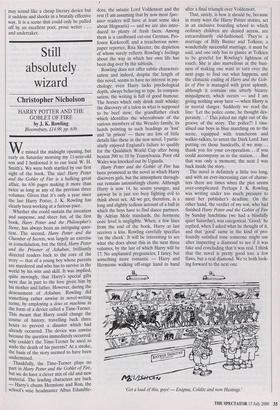Doing the business
Harry Mount
BODIES IN MOTION AND AT REST by Thomas Lynch Jonathan Cape, £10, pp. 240 ho wants to be an undertaker? Well, for quite a while in his youth, Thomas Lynch certainly did not. Even as his father tried to coax him into the family business — Lynch & Sons in Michigan — he was more interested in Irish poetry and travel- ling round Europe than embalming corpses; and who can blame him? As he grew older, he realised that these inter- ests were symptoms of a desire to write — poetry mostly, but also essays which have been gathered together in Bodies in Motion and at Rest. It turned out that he can write beautifully, in verse or prose, about any- thing — cats, love, abortion. But what he did not realise until later in life was that his best subject, death, had always been linger- ing right under his nose. For Lynch did join the family business in the end.
And, even if not many people want to become an undertaker, quite a few do want to know what it is like to be one. As Lynch writes, 'disease and death are, after all, going around', and the facts of death are almost as interesting as the facts of life. Lynch is no prude in producing these facts for our delectation. People are usually swaddled in their own bed linen. You can fit 1,000 coffins into an acre of graveyard. A cremated body produces about half a gallon of ashes. Adult coffins are all the same size. And you can often diagnose the cause of death just by looking at a body: victims of Aids or prostate cancer are skinny; liver failure brings on a tinge of green; a bulbous corpse shows that the kid- neys have packed up.
The chintzy, mercantile world of under- taking, as depicted in Evelyn Waugh's The Loved One, is alive and well. Lynch & Sons can do urns that look like golf bags. Other places turn out coffins that double as book- shelves or wardrobes until you need them for their real purpose, and ashes can be cast into paperweights or duck decoys. Lynch is alive to the ridiculous extras that come with the grander coffins — a key and a protective seal against air and moisture do seem otiose to requirements — but he is not disgusted by them. In a fine essay on Jessica Mitford and her book, The Ameri- can Way of Death, frequently to be found in the hands of bereaved visitors to Lynch & Sons, he reserves his disgust for her inabili- ty to accept that undertakers, like stockbro- kers and publishers and, indeed, distressed lady authors, need to make a living. And, unlike stockbrokers and publishers, under- takers have no way of increasing the amount of units they shift, save for resort- ing to murder. There are good patches: everyone in the trade is looking forward to the period between 2010 and 2040, when those born in the baby-boom years will start to die and the annual death count in the USA will hit 3 million — compared to 2.3 million at the moment. But, in the meantime, all they can do to increase turnover is embellish the packaging for that limited number of units they deal with.
Like stockbrokers and publishers, under- takers have a world beyond their work; Lynch jumps back into the land of the liv- ing to write about the break-up of his mar- riage and his alcoholism. The dreadful rhymes that were thrown at him when he joined Alcoholics Anonymous — 'Fake it till you make it' and 'Stay out of using places and using faces' — made it all the more difficult for him, as a poet, to give up drinking. A wry humour is injected into even the most confessional of the essays. 'A good laugh gets more company than a good cry; and whistling past the graveyard sells better than going in,' he writes.
All the same, Lynch stops whistling when he turns to the subject of his son's alco- holism. The son is described as 'laid out, cold, pale, dead to the world' and the read- er is given the impression that he is lying on the slab, about to receive the benefit of his father's professional skills once the morgue-workers have bagged his viscera and filled his cranium with cotton. Only four pages in do you realise that the boy is not dead, just in a deep drunken stupor. It may sound like a cheap literary device but it saddens and shocks in a brutally effective way. It is a scene that could only be pulled off by an excellent poet, prose writer . . . and undertaker.



























































 Previous page
Previous page